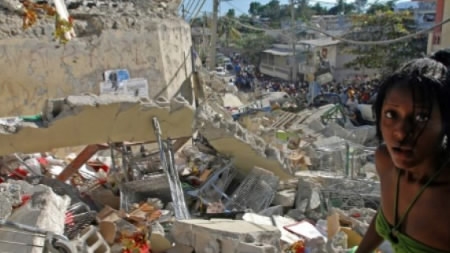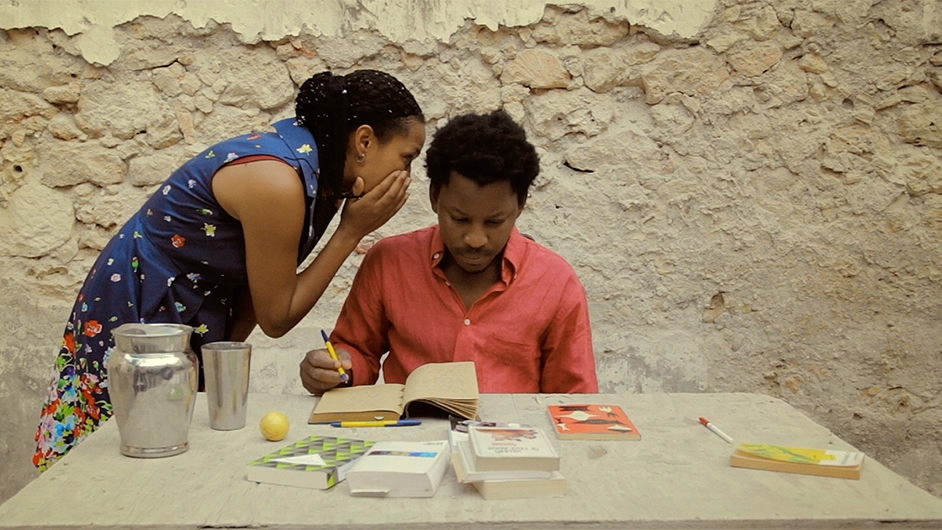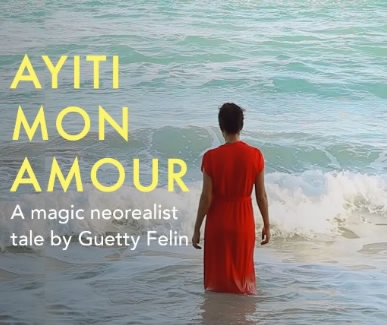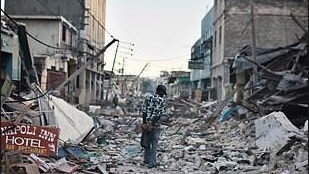
Culture
19:47, 01-Nov-2017
Haiti's first female-directed movie bids for Oscars
CGTN

Haiti might still be reeling from the 2010 earthquake that killed more than 220,000 people, but from the debris of its devastated towns, a nascent film industry has begun to emerge.
At the forefront is Guetty Felin, whose film "Ayiti Mon Amour," a portrait of a post-quake nation mourning its dead, was recently announced as the Caribbean country's first ever entry in the foreign film category at the Oscars.
Haitian-born Felin, who journeyed to Port-au-Prince on a relief airplane 10 days after the disaster, recalls the scenes that met her as she landed, images that have stayed with her as she has pursued a career in filmmaking.
"I had never smelled death before, corpses everywhere. I was just like, 'What is this stench?' All throughout the city, it was just devastating," she told AFP.

A scene from "Ayiti Mon Amour". /Reuters Photo
A scene from "Ayiti Mon Amour". /Reuters Photo
Laying waste to most of the Caribbean nation's schools, hospitals and infrastructure, the magnitude 7.0 quake injured some 300,000 people and left another 1.5 million homeless in what was already the poorest nation in the Americas.
Seven years on, "Ayiti Mon Amour" marks not only the emergence of a distinct new voice in Haitian filmmaking but a milestone in the country's cultural recovery, as the first ever locally-shot narrative feature directed by a woman.
Tapping into her past work in documentary, Felin infuses the realities of modern-day Haiti - the power and water shortages, the looming threat of climate change - with a lyricism that plays up its mystical side.
Brutal dictatorship
Set in Kabic, a small southeast fishing village where the sea is gaining ground thanks to climate change, Felin's camera shows life moving on, five years after the earthquake.
A teenager grieving his father discovers he has developed a literally electrifying superpower while an old fisherman who talks to his cow thinks the cure for his ailing wife can be found only in the sea.
Elsewhere, the beautiful, mysterious muse of a struggling novelist and the main character in his book, becomes restless and decides to leave him and pursue her own life.
Born in Port-au-Prince, Felin divided her childhood and adolescence between New York and Haiti, although she came of age artistically in Paris, where she studied for a graduate degree in film and ended up staying 20 years.

The film poster for "Ayiti Mon Amour". /Photo via Twitter
The film poster for "Ayiti Mon Amour". /Photo via Twitter
Felin fell in love with cinema at the drive-ins of Port-au-Prince, her escape during the brutal dictatorship of Francois "Papa Doc" Duvalier, who was followed by his despotic son Jean-Claude, or "Baby Doc."
"I grew up in this space knowing that the dictatorship existed, but at the time it was a space of joy," she said, recalling her childhood home as a place of music and parties.
"There were moments where you were totally afraid someone might get taken away. So the fragility of life - that dance that my parents had to do all the time - totally inspired me."
"Ayiti Mon Amour", which is looking for a US distributor, stars just one professional actor, while the rest of the cast and much of the crew were culled from the local community and Felin's own family.
Survivor's guilt
Her French husband, veteran cinematographer Herve Cohen, was in charge of filming and her oldest son Yeelen acted as her assistant, while his girlfriend performed second camera duties.
The real star of the movie, though, is Felin's youngest son, Joakim Ethan Cohen, a 17-year-old beginner at the time of the shoot who has won acclaim for an accomplished debut performance.
"He knew that what he was doing meant a lot to me. It was like his gift to me," said Felin.
"I directed him but it was so easy. Every take was really good and I think he knew the story inside out."

Damage from the Haiti earthquake in 2010. /Photo via sina.com
Damage from the Haiti earthquake in 2010. /Photo via sina.com
Haiti's film industry was already struggling before the earthquake. Its last picture house closed the year before amid rampant film piracy and no movies were publicly screened anywhere for five years after that.
"It's hard to make films in a place like Haiti because there's always something that happens that's prioritized, whether its political instability or there's a disaster or something like that," Felin said.
"Filmmaking is really not a priority for the Haitian people."
"Ayiti Mon Amour" was born out of the rubble of buildings leveled by the quake but Felin, who lost a close friend and says she feels "survivor's guilt," didn't want her movie to be just about grief.
"I kind of like to say that it's a love letter to this place, because it's a place at the same time that frustrates me, haunts me and angers me," the director said.
"But I'm deeply, deeply passionate about it."
Source(s): AFP

SITEMAP
Copyright © 2018 CGTN. Beijing ICP prepared NO.16065310-3
Copyright © 2018 CGTN. Beijing ICP prepared NO.16065310-3